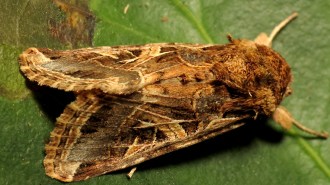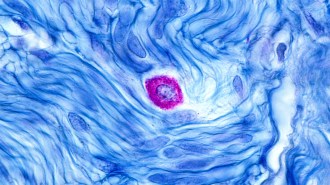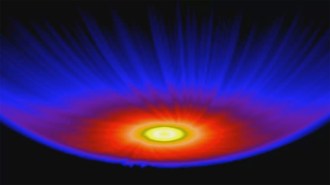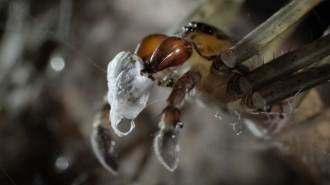News
-
 Health & Medicine
Health & MedicineU.S. hospitals continue to shut down labor and delivery services
More than half of rural hospitals and more than one-third of urban hospitals did not offer labor and delivery services in 2022.
-
 Animals
AnimalsThe screams of thirsty plants may prompt some moths to lay eggs elsewhere
Female moths may pick up on the ultrasonic wailing of distressed plants and opt to lay their eggs on different, healthier plants.
By Jake Buehler -
 Health & Medicine
Health & MedicineSome countries have eliminated malaria, but cases are growing elsewhere
Egypt was added to the list of malaria-free places in 2024, but climate change, conflict and other threats could increase cases especially in Africa.
-
 Health & Medicine
Health & MedicineDuring an allergic response, some immune cells digest others
Mast cells lure and trap other immune cells during allergic reactions, using their compounds to increase inflammation in a process dubbed nexocytosis
-
 Archaeology
ArchaeologyThe oldest known ritual chamber in the Middle East has been found
Engravings and other evidence suggest ancient humans attended religious ceremonies in the cave as early as 37,000 years ago.
By Bruce Bower -
 Health & Medicine
Health & MedicineA squid-inspired medical device could reduce the need for needles
The device, which directs a liquid by mimicking squids’ high-pressure jets, could provide alternative delivery methods for injectable drugs.
-
 Health & Medicine
Health & MedicineProposed time limits on anesthesia may have jeopardized patient safety
Blue Cross Blue Shield’s now rescinded plan to put time limits on anesthesia put a spotlight on a poorly understood profession.
By Sujata Gupta -
 Physics
PhysicsNotre Dame is reopening. What does that mean for its acoustics?
Researcher Brian Katz is studying the acoustics of the Paris cathedral and how it’s been altered throughout the centuries.
-
 Astronomy
AstronomyAstronomers see the astrosphere of a sunlike star for the first time
Finding a bubble of hot gas blown by the stellar wind from a young star gives researchers a peek at what our sun was like when it was young.
-
 Health & Medicine
Health & MedicineHow the weight loss drug tirzepatide is also helping heart failure patients
Data continue to show that tirzepatide, called Mounjaro for type 2 diabetes and Zepbound for weight loss, is safe and effective, but side effects remain.
By Meghan Rosen -
 Animals
AnimalsClimate stress may undermine male spiders’ romantic gift giving
Even spider love lives show an effect of climate uncertainty: Stressed males may offer a bit of silk-wrapped junk rather than a tasty insect treat.
By Susan Milius -
 Space
SpaceA spacecraft duo will fly in formation to create artificial solar eclipses
ESA’s Proba-3 mission will use one satellite to block out the sun for another satellite, bringing the sun’s middle corona into new focus.